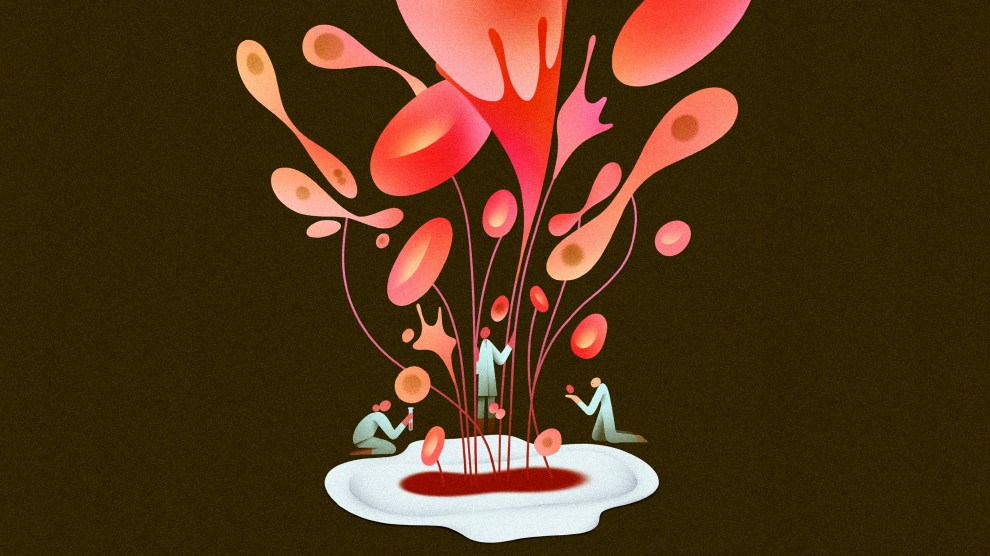
Jaequan Faulkner at his hot dog stand in Minneapolis, Minnesota. Elizabeth Flores/Star Tribune/Zuma Wire
At first, it seemed like trouble: Someone called the Minneapolis Health Department to complain about 13-year-old Jaequan Faulkner and his summer hot dog stand.
But here’s what happened next: The city actually helped the teenager pass his health inspection test and get a permit for his business. The police came by—and posed for a photo with the young entrepreneur.
“I like having my own business,” Faulkner told the Star Tribune. “I like letting people know just because I’m young doesn’t mean I can’t do anything.”
Faulkner serves about 20 customers for four hours each weekday. And next year, he hopes to donate a small portion of his sales to raising awareness about depression and youth suicide. “It’s not about the money,” Faulkner says about his hot dog stand. “It’s just something I enjoy doing.”
Looking for a break from pomposity and conflict? Read on for stories of people who worked to help others. Recharge is a weekly newsletter full of stories that will energize your inner hellraiser. You can sign up at the bottom of the story.
-
Finding the right notes, thanks to commenters. Her father loved the song. Jenna Glanzer didn’t know all the notes, but she wanted him to hear it after he got dementia. So she went on Reddit last year with a video clip of herself playing as much as she could remember—and readers filled in the missing notes.
Thanks to their comments, Glanzer was able to identify the song and record herself playing a complete version for her dad. Unfortunately, he turned away quickly, distracted. But she took solace in the the support she received from readers.
“I don’t get emotional hardly ever, but when I see strangers helping strangers, that’s when I tear up a bit,” Glanzer said.
Learning the full version of “Little Spring Song” has also cheered her immensely, she said. “Being able to play that song myself…made me feel so much closer to him.” (Washington Post)
- Just because a person is homeless…doesn’t mean he or she shouldn’t get a decent haircut. That’s why a Philadelphia barber wants to raise money for a “mobile barbershop”—an RV in which he’d go to the people and cut their hair.
Josh Santiago has been giving free haircuts to the city’s homeless since 2017, and he now wants to take his initiative even further with his RV. He takes photos of his clients and shares their stories on Instagram, in hopes that his work will help bring attention to their struggles.”Is there any way possible I could bless you with a haircut today?” Santiago asked one recent day.
Robert Pullins, who was homeless but planned to start a truck-driving job the following week, said yes—and Santiago got to work, his trimmer humming.
Pullins laughed when he rose from the barber’s chair. “I feel rejuvenated. I feel fresh…I feel good-looking now. And I feel a boost of my spirit.” (Al Día)
-
How one city saved itself from a water crisis. It was an ancient idea: Do a better job of trapping the rainwater.
For the southern Indian city of Chennai, which has more than doubled its population in the past 25 years to nearly 8 million, the decision and the massive operation that followed over the next 15 years were lifesavers.
The problem, in short: Paved roads and modern buildings broke up how water got to Chennai’s aquifers. So physicist Sekhar Raghavan proposed a network of pipes and filters to capture the rain from rooftops, driveways, sidewalks, and other areas. The water would then be stored in collection tanks or used to replenish the aquifers. In 2002, the state government began mandating such water collectors on every building in the city.
It made a world of difference.
“What people don’t understand,” says Raghavan, “is that all the freshwater in the world ultimately comes from rain.” (Ensia)
-
“Stop and listen! Our girls are missing!” She’s 13. She wanted to bring attention to the cases of missing and murdered black women in Chicago. So she organized a march that brought out dozens of people and shut down traffic.
“I want black girls to get together to protect ourselves and each other,” says Aziya Roberts, who led the march last month. “All we have is each other and this is the time to start being there for one another.”
She and her mother, Tricey Robinson, as well as other marchers, say media and police have a bias in how they report and investigate the cases of missing black women compared to white women.
“That’s what the whole march was about,” Robinson said. “No one is helping us.” (Block Club Chicago)
- But that’s not all…here are a few more good news stories for your week.
- Police saw him walking a 20-mile route to work after his car broke down. His plight prompted his company’s CEO to give him a car. (BoingBoing)
- When a fire damaged the offices of a 165-year-old weekly newspaper in Vermont, the town’s residents helped save computers and get out the next edition. (Boston Globe)
- In several battleground states, under-30 residents are registering to vote at significantly higher rates, suggesting youth turnout could be far higher than in previous midterm elections. (Mother Jones)
- A New Zealand company’s experiment with a four-day workweek is a resounding success. Should more companies do it? (The Guardian)
Have a Recharge story of your own or an idea to make this column better? Fill out this form or send me a note to me at recharge@motherjones.com. Have a great week ahead and make sure to sign up for the newsletter below.
















